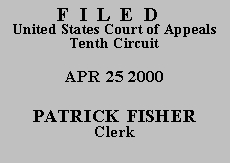

| PAUL EDWIN FREE,
Plaintiff-Appellant,
v.
FEDERAL BUREAU OF PRISONS;
USP, Florence, Colorado; R. E.
HOLT, Warden, USP, Florence,
Colorado Defendants-Appellees. |
No. 99-1520
(D.C. No. 99-Z-1029) (Colorado) |
Paul Edwin Free, a pro se prisoner, filed this action in the District of Colorado pursuant to Bivens v. Six Unknown Agents of Fed. Bureau of Narcotics, 403 U.S. 288 (1971), in June 1999. Around the same time, Mr. Free also filed a motion in the Eastern District of Michigan to vacate, set aside, or correct his sentence pursuant to 28 U.S.C. § 2255. Mr. Free's Bivens action alleges he was deprived of access to the courts due to the inadequacy of the prison law library, his lack of access to the library, and mail tampering by prison employees. These circumstances, he argued, made it difficult for him to research and write a reply to the government's answer to the section 2255 motion.
On September 21, 1999, the district court issued an order in the Bivens action dismissing Mr. Free's complaint as legally frivolous under 28 U.S.C. §1915(e)(2)(B). Eight days later, Mr. Free filed a Motion for Leave to File a Supplemental Complaint, which was denied by minute order the same day. On October 13, 1999, he filed a Motion to Reconsider both the minute order and the order dismissing the action. Because the Motion to Reconsider was filed more than ten days after the court's order of dismissal, the district court considered it under Fed. R. Civ. P. 60(b). The district court denied the motion on October 20, 1999. On November 12, Mr. Free filed an appeal of the district court's September 21 Order dismissing the action.
The Federal Rules of Appellate Procedure require a notice of appeal to be filed within thirty days after the order appealed from. Fed. R. App. P. 4(a)(1)(A).(1) Because Mr. Free filed his notice of appeal more than thirty days after the September 21 order, we are without jurisdiction to consider it. See Hinton v. City of Elwood, Kansas, 997 F.2d 774, 777 (10th Cir. 1993). Because the notice of appeal was filed within thirty days of the October 20 order denying the 60(b) motion to reconsider, however, we have jurisdiction to review that order. An appeal from the denial of a Rule 60(b) motion addresses only the district court's order denying the motion, and not the underlying decision. See Servants of the Paraclete v. Does I-XVI, 204 F.3d 1005, 1009 (10th Cir. 2000).
We review the district court's denial of a Rule 60(b) motion for abuse of discretion. See Federal Deposit Ins. Corp. v. United Pac. Ins. Co., 152 F.3d 1266, 1272 (10th Cir. 1998). Relief under Rule 60(b) is "extraordinary," and the district court should only grant it "in exceptional circumstances." Bud Brooks Trucking, Inc. v. Bill Hodges Trucking Co., 909 F.2d 1437, 1440 (10th Cir. 1990).
The district court correctly pointed out that Mr. Free failed to present any extraordinary circumstances that would justify vacating its order and judgment of dismissal. Mr. Free's Motion to Reconsider contains substantially the same arguments and allegations set forth in his initial complaint, his motion for injunctive relief, and his brief in support of his motion to file a supplemental complaint. The district court understandably remained unconvinced that it had misapplied the law or misunderstood Mr. Free's position. Because Mr. Free has failed to demonstrate any exceptional circumstances, the district court did not abuse its discretion in denying his Rule 60(b) motion.
AFFIRMED.
ENTERED FOR THE COURT
Stephanie K. Seymour
Chief Judge
*.This order and judgment is not binding precedent, except under the doctrines of law of the case, res judicata, or collateral estoppel. The court generally disfavors the citation of orders and judgments; nevertheless, an order and judgment may be cited under the terms and conditions of 10th Cir. R. 36.3.
1.This time limit may be tolled by the filing of a motion within ten days under Fed. R. Civ. P. Rule 59(e) to alter or amend the judgment. See Fed. R. App. P. 4(a)(4)(A). Because Mr. Free filed the motion to reconsider more than ten days after the district court dismissed the action, it did not toll the time for filing a notice of appeal.